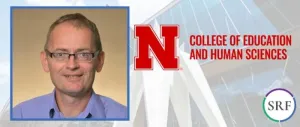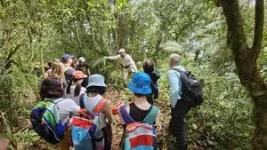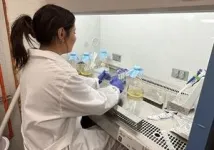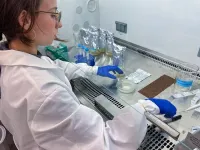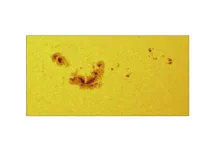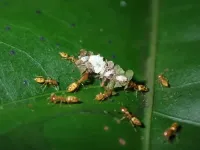(Press-News.org) Mill Valley, CA – July 10, 2024 – The SynGAP Research Fund 501(c)(3) announces a $190,636 grant, for work to be done in 2024 and 2025, to Professor Janos Zempleni, PhD of the University of Nebraska-Lincoln, to establish data required for regulatory approval for his novel treatment using an engineered version of naturally-occurring particles called exosomes. His first grant from SRF established the engineered changes required to accumulate exosomes in the brain. SRF is pleased to support the continued development of a non-invasive and targeted delivery system for therapeutics to treat SYNGAP1-Related Disorders (SRD).
Why We Supported This Project
SynGAP Research Fund’s mission to accelerate the development of treatments for SYNGAP1-Related Disorders includes a broad range of steps that it takes to go from idea to medicine. Every therapeutic strategy requires a delivery system, and Professor Zempleni’s delivery system was optimized in his previous SRF- funded project. The current grant advances the engineered exosome delivery system loaded with SYNGAP1 mRNA to safe and effective use in patients, from its current status: effective in animal studies. To move into humans, regulatory agencies will require answers to questions such as:
What is the shelf-life of the therapeutic delivery system?
What is the appropriate dosage and frequency of treatment?
Will there be an immune, kidney, or liver response to this therapeutic?
What is the half-life in the body when administered?
Building on Promising Early Results
Professor Zempleni gave SRF a wonderfully accessible presentation back in March of 2022 that explains exosomes to a broad lay audience. Exosomes are naturally occurring vesicles that are being engineered and harnessed for delivery of multiple types of drugs, from precision medicine (DNA, RNA) to proteins and small molecules. His research has identified signals that can be added on the surface that help the exosomes target the brain and escape clean-up by immune cells. In addition, he has shown that multiple types of cargo can be packaged in exosomes, given to mice, and that the cargo can be found in mouse brains.
Professor Zempleni also presented at the SRF SYNGAP1 Science Conference in November 2023. He states, “I am fortunate to be part of this excellent program. I am confident that our efforts will pay off.”
“Professor Zempleni’s research is absolutely cutting edge— harnessing a natural process of how cells communicate and turning it into a delivery system to make more SynGAP. SYNGAP1 science and our loved ones are lucky to have him on the case,” per Hans Schlecht, MD, MMSc, SRD parent and advocate.
“The research conducted by Professor Zempleni is a prime example of the world-class, transformational research conducted in the College of Education and Human Sciences,” said Nick Pace, acting dean of the College of Education and Human Sciences at the University of Nebraska–Lincoln. “With support from the SynGAP Research Fund, Professor Zempleni’s efforts to help SynGAP patients are amplified and will hopefully result in effective treatment and therapies.”
“The work ahead is exciting, as we see multiple treatments in development get closer to being in humans. The development of therapies that improve the functioning of cells and tissues that currently don’t have enough working SynGAP protein – that is the unifying goal for everything SRF does, said Kathryn Helde, Chief Scientific Officer at SRF. She continues: “The idea that exosomes could be used for multiple types of therapeutics gives me additional hope for reducing suffering for our loved ones and our families.”
SRF Family Donations Make Progress Possible
“I am grateful to SRF’s donors – our families and their friends – who have trusted us and enabled us to make impactful grants like this one,” says Mike Graglia, Founder & CEO of SRF. He continues, “Professor Zempleni is a strong partner and understands that our support arrives from families caring for very ill patients; they are eager to see real progress. We are indeed fortunate to have put SYNGAP1 on his radar and brought him into #TeamSRF.”
About the Zempleni Lab
The Zempleni lab has pioneered research on natural nanoparticles (“exosomes”) in milk and their utilization in the delivery of therapeutics to hard-to-reach tissues with heretofore unknown specificity and efficiency. “We will apply our expertise to find treatments and perhaps a cure for SYNGAP1 patients.”
About the College of Education and Human Sciences at the University of Nebraska–Lincoln
The College of Education and Human Sciences at the University of Nebraska–Lincoln is dedicated to enhancing the lives of individuals, families, schools, and communities, and strengthening the relationships among them. The work of the college in the areas of teacher preparation and school leadership, health and wellness, human development, family science, textiles, apparel, and the hospitality industries is aimed at one thing: helping people achieve their maximum potential. Learn more at cehs.unl.edu.
About SYNGAP1-Related Disorder (SRD)
SYNGAP1-Related Disorder (ICD-10 F78.A1; ICD-11 LD90.Y) is a rare genetic disorder caused by variants on the SYNGAP1 gene that reduce SynGAP protein levels. SRF has identified over 1,454 patients to date, and the number grows weekly. This protein acts as a regulator in the synapses (where neurons communicate with each other). When SynGAP protein levels are too low, we see an increase in excitability in the synapses making it difficult for neurons to communicate effectively. This leads to many neurological issues seen in SynGAP patients.
Symptoms of SYNGAP1 include primarily neurological issues, including autism spectrum disorder, intellectual disability, epilepsy, hypotonia (low muscle tone), gross and fine motor delays, and visual abnormalities such as strabismus (crossed eyes) as well as gastrointestinal challenges and disordered sleep.
About the SynGAP Research Fund (SRF)
The mission of the SynGAP Research Fund (SRF) is to improve the quality of life for SYNGAP1 patients through the research and development of treatments, therapies, and support systems.
SRF was founded in the US in 2018 as a 501(c)(3) US public charity, and families created sister organizations for SRF in the UK in 2020, in Europe (Netherlands) in 2022, and in Latin America (Colombia) in 2023. Completely family-led, SRF is the largest non-government funder of SynGAP research having committed over $6 million in grants. The founders cover operational costs, ensuring donations fund science & patient-related programs. SRF’s grant program awards one or two-year grants to investigators, physician residents, and clinicians interested in studying SYNGAP1. SRF grants are intended to help researchers explore novel ideas and answer open questions related to the clinical aspects of and therapies for SRD.
For more on SRF, visit curesyngap1.org or follow @cureSYNGAP1 on LinkedIn, YouTube, Instagram, Facebook, TikTok, or X.
SRF is a member of FasterCures, COMBINEDbrain, Global Genes Foundation Alliance, Everylife Foundation Community Congress, Epilepsies Action Network, Personalized Medicine Coalition, Rare Epilepsy Network, Epilepsy Leadership Council, Alliance for Genetic Etiologies in Neurodevelopmental Disorders and Autism (AGENDA), California Action Link for Rare Diseases, American Brain Coalition, Genetic Alliance UK, Rare Disease UK, Syndromes Without a Name (SWAN UK), Jumpstart Program, Patient Worthy, Autism Brain Net, Innovation and Value Initiative, Rare Disease Diversity Coalition, Cambridge Rare Disease Network, Breaking Down Barriers, Rare-X, Mencap, IndoUSRare, and The World Orphan Drug Congress.
END
SynGAP Research Fund (SRF) continues support for exosome research for SYNGAP1-Related Disorders (SRD) in the lab of Professor Janos Zempleni of the University of Nebraska-Lincoln
Exosomes could be a non-invasive and targeted delivery system for therapeutics to treat SYNGAP1-Related Disorders (SRD) and other NDDs.
2024-07-19
ELSE PRESS RELEASES FROM THIS DATE:
Food research fellowships funded for scientists in 6 countries
2024-07-19
DALLAS, July 18, 2024 — Diet-related diseases account for 1 in 5 deaths around the world[1] and unsustainable industrial agricultural practices threaten to compromise the health of the planet.[2] While emerging science expands our knowledge of food composition, society still understands little about the tens of thousands of components found in food.
The American Heart Association is facilitating a new research fellowship program from the Periodic Table of Food Initiative (PTFI) with support from The Rockefeller Foundation. The program, called Good Food Fellows, aims to train a new ...
Illinois studies explore converting wastewater to fertilizer with fungal treatment
2024-07-19
URBANA, Ill. – Creating fertilizers from organic waste can help reduce the consumption of fossil fuels and promote sustainable production. One way of doing this is through hydrothermal liquefaction (HTL), which converts biomass into biocrude oil through a high-temperature, high-pressure process. Two studies from the University of Illinois Urbana-Champaign explore the use of a fungal treatment to convert the leftover wastewater into fertilizer for agricultural crops.
“HTL uses wet biomass from organic sources such as swine manure or food waste. The process yields wastewater, called hydrothermal liquefaction aqueous phase (HTL-AP), which is usually discarded. We ...
Time-lapse imaging for embryo selection in IVF does not improve the odds of live birth compared with conventional methods, according to largest study of its kind
2024-07-19
There is no difference in live birth rates between time-lapse imaging and other standard approaches used in in-vitro fertilisation (IVF) for embryo incubation and selection prior to implantation, according to the results of the largest trial of its kind.
The randomised controlled trial looked at IVF outcomes in the UK and Hong Kong. The results, published today in The Lancet, provide much-needed evidence that using time-lapse imaging (TLI) does not improve treatment outcomes for someone undergoing fertility treatment.
Time-lapse imaging is a technique ...
Early riser! The Sun is already starting its next solar cycle – despite being halfway through its current one
2024-07-19
Early riser! The Sun is already starting its next solar cycle – despite being halfway through its current one
Royal Astronomical Society press release
RAS PR 24/21 (NAM 7)
Embargoed until 00:01 BST on Friday 19 July 2024
The first rumblings of the Sun's next 11-year solar cycle have been detected in sound waves inside our home star – even though it is only halfway through its current one.
This existing cycle is now at its peak, or 'solar maximum' - which is when the Sun’s magnetic field flips and its poles swap places - until mid-2025.
It affects ...
Oakland hospital building is approved for construction
2024-07-19
Subscribe to UCSF News
Note to Editors: Photos and renderings are available in our Media Kit
UC Regents sign off on $1.5 billion project to construct a new hospital building at UCSF Benioff Children’s Hospital Oakland, securing the future of world-class pediatric facilities in the East Bay.
UCSF Benioff Children’s Hospitals has received final approval on a $1.49 billion hospital building on its Oakland campus that will provide a state-of-the-art, child-centered medical facility for families across the Bay Area. The proposal was approved ...
Rice’s Emilia Morosan awarded prestigious Vannevar Bush Faculty Fellowship
2024-07-18
Rice University’s Emilia Morosan has been selected as one of 11 scientists and engineers for the 2024 Vannevar Bush Faculty Fellowship (VBFF) to support her work on correlated topological materials. The fellowship is the Department of Defense’s (DoD) most prestigious single-investigator award and supports groundbreaking basic research with the potential to transform various fields.
The VBFF, a five-year fellowship with up to $3 million in funding, encourages innovative ideas where researcher creativity intersects with the unknown. Vannevar Bush Fellows represent a cadre of experts who provide invaluable direction to the DoD ...
DOE announces $52 million for small business research and development grants
2024-07-18
WASHINGTON, D.C.—In support of President Biden’s Investing in America agenda, the U.S. Department of Energy (DOE) today announced awards totaling $52 million for a broad range of small businesses in 39 states. The projects will work to solve a wide range of problems—from cybersecurity for electric vehicle charging infrastructure to new ways to detect radiation threats and new ways to manufacture lithium metal for batteries.
“Since Day One, the Biden-Harris Administration has supported small businesses, prompting record ...
Of ants and trees: ‘Evolutionary déjà’ in the tropical rainforest
2024-07-18
Ants are famous for their regimented and complex social behaviors. In the tropics, they are also famous for forming mutualisms with plants. Certain species of trees have conspicuous hollow swellings that house ants, often feeding the ants with specialized ant food. In return, the ants are pugnacious bodyguards, swarming out to aggressively defend the plant against enemies. Scientists have observed these mutualisms for centuries, but an enduring question is how these intriguing interactions evolved in the first place.
That remains a mystery, but new research led by University ...
Tumor-infiltrating lymphocyte therapy marks a milestone in cancer treatment
2024-07-18
TAMPA, Fla. — The recent U.S. Food and Drug Administration approval of lifileucel, the first commercial tumor-infiltrating lymphocyte (TIL) therapy for advanced melanoma, marks a significant breakthrough in cancer therapy. In a new commentary published in Cancer Cell, Moffitt Cancer Center scientists provide a comprehensive overview of the therapy’s development and highlight its transformative potential.
“TIL therapy represents a major advancement in personalized cancer treatment, offering new possibilities for patients with treatment-resistant cancers,” said Amod Sarnaik, M.D., ...
New research on climate change, gut health, and socioeconomic status’ impact on stroke and aneurysm care to be presented at Society of Neurointerventional Surgery’s 21st Annual Meeting
2024-07-18
FOR IMMEDIATE RELEASE: July 18, 2024
CONTACT: Camille Jewell, cjewell@vancomm.com or 202-248-5460
COLORADO SPRINGS, Colo. — Neurointerventional surgeons from across the globe will gather at the Society of NeuroInterventional Surgery’s (SNIS) 21st Annual Meeting from July 22 through July 25 in Colorado Springs, Colorado, to present novel research and innovation in their field.
The conference, held at the Broadmoor Resort, will be a hybrid event with in-person and livestreamed content. Meeting sessions will cover new topics ranging from how living in coal mining areas worsens outcomes ...
LAST 30 PRESS RELEASES:
Start school later, sleep longer, learn better
Many nations underestimate greenhouse emissions from wastewater systems, but the lapse is fixable
The Lancet: New weight loss pill leads to greater blood sugar control and weight loss for people with diabetes than current oral GLP-1, phase 3 trial finds
Pediatric investigation study highlights two-way association between teen fitness and confidence
Researchers develop cognitive tool kit enabling early Alzheimer's detection in Mandarin Chinese
New book captures hidden toll of immigration enforcement on families
New record: Laser cuts bone deeper than before
Heart attack deaths rose between 2011 and 2022 among adults younger than age 55
Will melting glaciers slow climate change? A prevailing theory is on shaky ground
New treatment may dramatically improve survival for those with deadly brain cancer
Here we grow: chondrocytes’ behavior reveals novel targets for bone growth disorders
Leaping puddles create new rules for water physics
Scientists identify key protein that stops malaria parasite growth
Wildfire smoke linked to rise in violent assaults, new 11-year study finds
New technology could use sunlight to break down ‘forever chemicals’
Green hydrogen without forever chemicals and iridium
Billion-DKK grant for research in green transformation of the built environment
For solar power to truly provide affordable energy access, we need to deploy it better
Middle-aged men are most vulnerable to faster aging due to ‘forever chemicals’
Starving cancer: Nutrient deprivation effects on synovial sarcoma
Speaking from the heart: Study identifies key concerns of parenting with an early-onset cardiovascular condition
From the Late Bronze Age to today - Old Irish Goat carries 3,000 years of Irish history
Emerging class of antibiotics to tackle global tuberculosis crisis
Researchers create distortion-resistant energy materials to improve lithium-ion batteries
Scientists create the most detailed molecular map to date of the developing Down syndrome brain
Nutrient uptake gets to the root of roots
Aspirin not a quick fix for preventing bowel cancer
HPV vaccination provides “sustained protection” against cervical cancer
Many post-authorization studies fail to comply with public disclosure rules
GLP-1 drugs combined with healthy lifestyle habits linked with reduced cardiovascular risk among diabetes patients
[Press-News.org] SynGAP Research Fund (SRF) continues support for exosome research for SYNGAP1-Related Disorders (SRD) in the lab of Professor Janos Zempleni of the University of Nebraska-LincolnExosomes could be a non-invasive and targeted delivery system for therapeutics to treat SYNGAP1-Related Disorders (SRD) and other NDDs.
